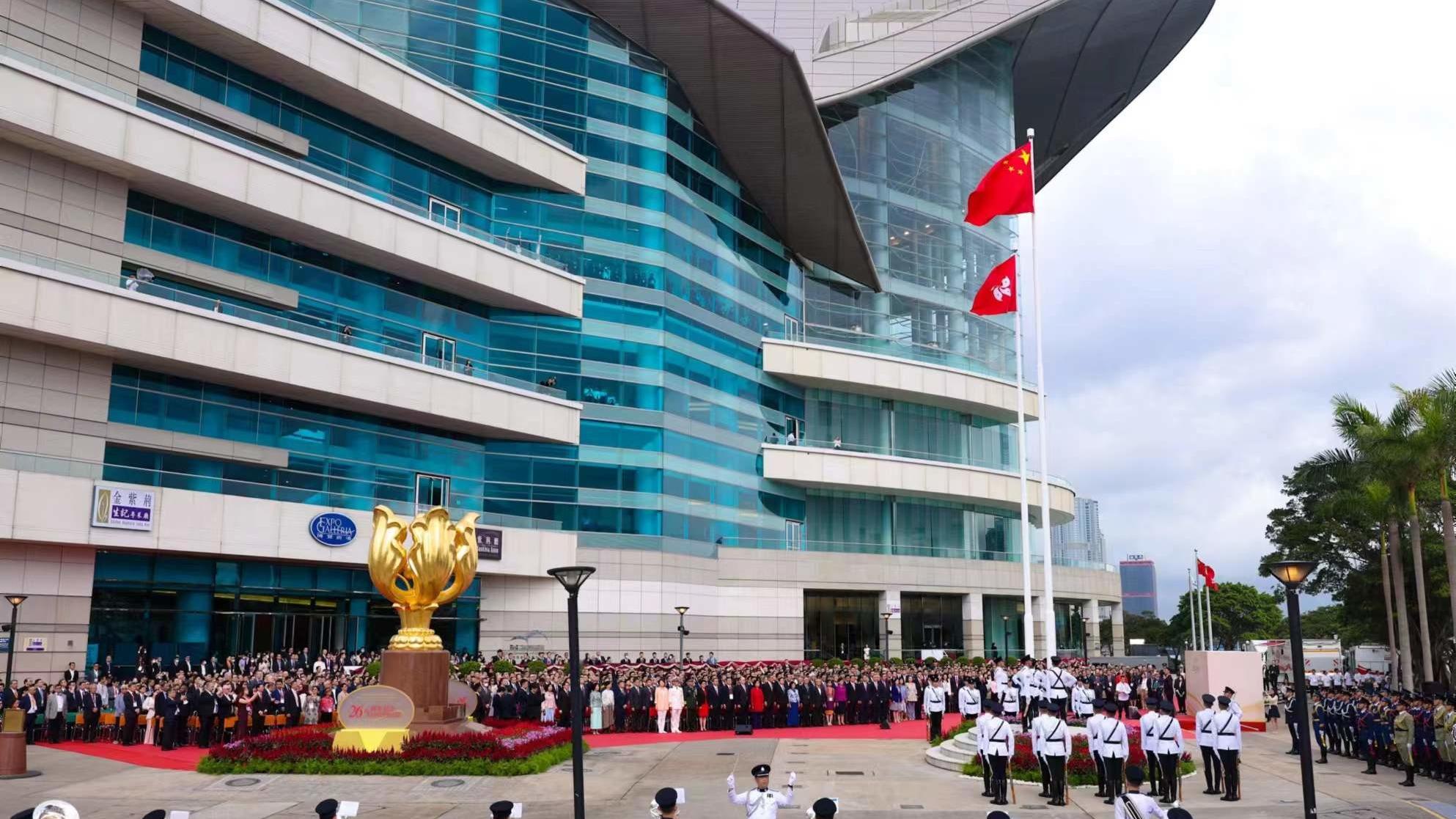 A flag-raising ceremony is held at the Golden Bauhinia Square to mark the 26th anniversary of the SAR's return to the motherland on July 1, 2023. (CALVIN NG / CHINA DAILY)
A flag-raising ceremony is held at the Golden Bauhinia Square to mark the 26th anniversary of the SAR's return to the motherland on July 1, 2023. (CALVIN NG / CHINA DAILY)
Hong Kong has every reason to celebrate the 26th anniversary of its return to the motherland with the same amount of enthusiasm as felt for significant anniversaries such as the 25th, 20th, 15th and 10th.
While the city's economic recovery is still less than impressive and the longstanding housing shortage and other livelihood problems remain to be tackled, gone is the widespread dark mood that had plagued the local community over recent years.
Hong Kong must keep in mind there is no room for second thoughts when it comes to integrating its own development into the nation's overall development strategy
Aside from the fact that the pesky COVID-19 pandemic is finally drawing to an end and the reforms in the special administrative region's governance framework over the past three years - including most notably the promulgation of the National Security Law for Hong Kong and the overhaul of the city's electoral system - that have assured them of long-lasting peace and stability in their home city, residents have also taken comfort from the much brighter prospects for the city.
READ MORE: HKSAR to get into festive mode for its 26th anniversary
The brighter prospects can be explained by the rising odds of Hong Kong eventually breaking its economic bottlenecks and solving the city's livelihood problems sooner rather than later. Public confidence in the city's future has been rising, and rightly so, since the incumbent HKSAR administration put into action its promised proactive, results-oriented governance philosophy in its first year in office. Well-begun is half-done, as the saying goes.
The strategy to expand the global reach of Hong Kong's financial and professional services by tapping the huge markets in the Middle East region and member states of the Association of Southeast Asian Nations, as revealed by Chief Executive John Lee Ka-chiu's work trips to these regions - along with his key officials - over the past several months, bodes well for the future of these two industries, which are part of Hong Kong's traditional four pillar industries.
And a series of visits, within a few months, by the chief executive, principal officials and Legislative Council members to the mainland partner cities in the Guangdong-Hong Kong-Macao Greater Bay Area to promote cooperation and collaboration between the two sides signaled a sense of urgency in the HKSAR administration to tackle Hong Kong's economic and livelihood problems by tapping the resources of the mainland via hastening the city's integration into the city cluster, a vibrant economic powerhouse in China and one of the four largest bay areas in the world.
It is logical that Hong Kong's integration into overall national development is gaining pace under the proactive governance philosophy of the incumbent HKSAR administration. Hong Kong has become a center of international finance, trade, shipping and professional services not by chance but by taking advantage of the unparalleled mainland market, which has created an insatiable demand for Hong Kong's services, capital and know-how over the past several decades. The fact that no city without a large economic hinterland to serve has ever become an international hub for finance and trade provides convincing evidence to support this notion.
READ MORE: Bustling Hong Kong is back
Hong Kong must keep in mind there is no room for second thoughts when it comes to integrating its own development into the nation's overall development strategy. The city's prosperity and stability hinges on its ability to play a significant role in national development, as has been the case over the past several decades; and this is truer today than ever with the global geopolitical situation worsening by the day. But then, Hong Kong residents can rest assured that the city will continue to play a significant role in national development as the national 14th Five-Year Plan (2021-25) indicates. And more reassuring is President Xi Jinping's declaration in his speech marking the HKSAR's 25th anniversary that "one country, two systems" must be maintained in the long term, which has boosted both foreign investors' and Hong Kong residents' confidence in the city's future.


